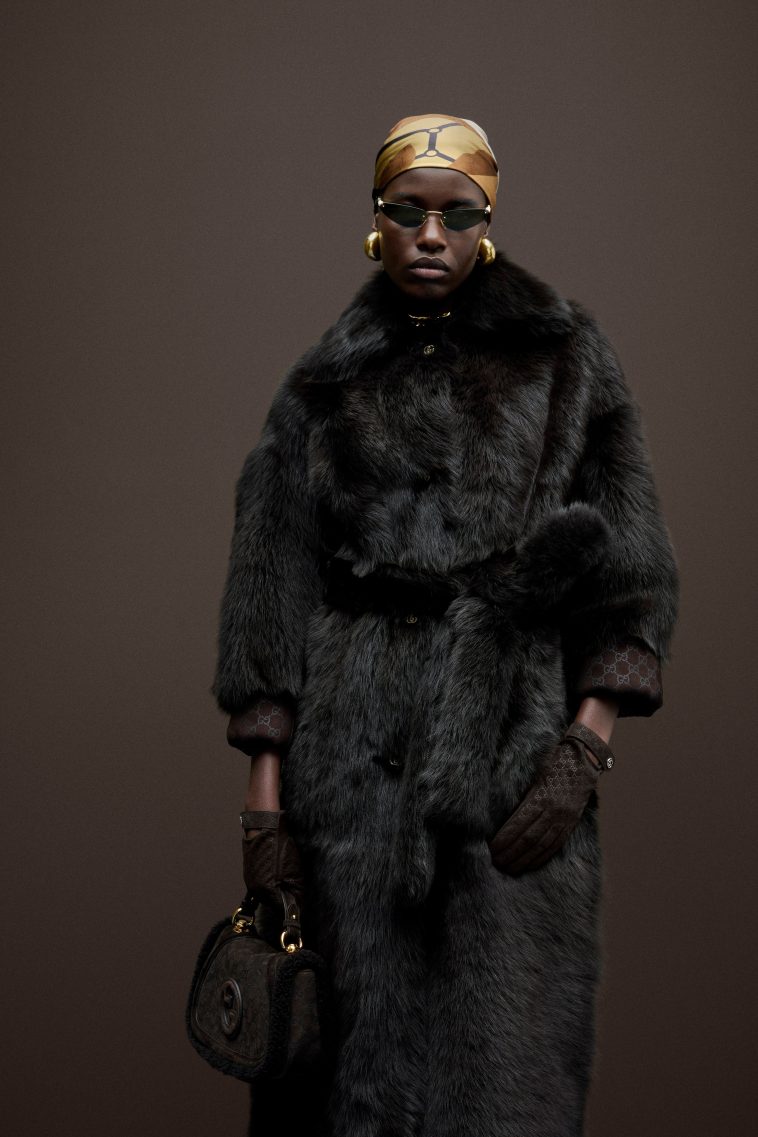Sabato De Sarno said that he started the new Gucci pre-fall collection by looking at the house’s history in the 1970s. Via text provided by the company, the designer added: “It was an immersion into that casual grandeur we now recognize as part of Gucci’s DNA: a daily elegance, simple yet deeply Italian, made of beautiful things designed to be worn, never ordinary. For this collection, I wanted to reimagine and reinterpret all those elements in a way that feels fresh and relevant, without nostalgia.”
Reinforcing codes without leaning overly retro is a tricky balance to strike for heritage brands because, almost by definition, today’s objects of nostalgia were once yesterday’s totems of modernity. One key De Sarno strategy to crash this concurrence are his continued experiments with “wrong colors”: recognizably Gucci pieces in combinations that you would never have imagined seeing in the versions (even had they not been shot in black and white) that inspired these reinterpretations. Here notable examples included the ribbed wool ‘trompe twinsets’ (single integrated garments) in sequin-edged combinations of lilac and lemon. The showroom also contained cotton candy faux furs in the same saccharine shades, while on other garments there were more variations of his central off-olive and berry-burgundy conversation. Sharply tailored patch pocket suiting for both genders was cut in more off-kilter, vaguely mesmerizing micro-gingham color-combos.
Another De Sarno trick to bring his starting point back to the future was through placing the evidently contemporary (boxy indigo denim) against the evidently historic (a cropped jacket in herringbone black and brown). Similarly a floral scarf pattern sourced from the Florence archive was reconfigured onto a cotton/wool jacquard work jacket as well as silk dresses. There were considered diversions into broadly-proportioned and powerfully colored militaria in womenswear, and tonally harmonic Ivy League in menswear. De Sarno broke the specifically 1970s spell of the bell-bottom pant by presenting his with a split running several inches up the seam from their front hems: all the better for flashing suede runners and two tone horsebit loafers.
Lopapeysa pattern sweaters came spangled with sequins and cropped shearlings were brightly dyed to reflect that same Icelandic source material. A raglan sleeve overcoat in prince of wales check, with that burgundy flashing from beneath the collar, was cut with De Sarno’s favored box pleat at the back and two lateral side-splits: retro but also beyond. A lot of this collection was about painstakingly considered detail in silhouette and visual texture generated in order to offer novelty. There were also gestures towards fatto a mano and craft in the dress of macramé flowers and the richly finished leathers.
De Sarno is a highly technical and passionately precise designer who has moved Gucci on from the everything, everywhere, all at once iteration that preceded his. Yet as Karl Lagerfeld once observed: “fashion is about two things: the evolution and the opposite.” Sometimes De Sarno might play with the idea of inserting some more oppositional jolts—whether in silhouette, storytelling, or something else entirely—against which to frame the highly specific subtleties of the Gucci evolution he continues to shape.





GIPHY App Key not set. Please check settings